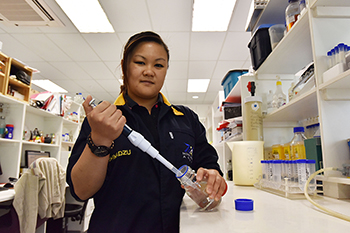Latest News Archive
Please select Category, Year, and then Month to display items
![]()
The executive management of the University of the Free State (UFS) takes note of the recording made by a spectator at Shimla Park on the Bloemfontein Campus during the Varsity Cup rugby match between Shimlas and the University of Johannesburg on Monday 26 February 2018. As the recording was made from behind, attempts are being made to identify the persons who were seated during the singing of the National Anthem, and stood up and sung only the Afrikaans part of the National Anthem. It is not clear at this stage if all the individuals in the recording are registered students of the UFS. However, the executive management is of the opinion that – although it might be unintentional – the message that is being conveyed through the action of the individuals is disrespectful towards the country’s National Anthem.
Released by:
Lacea Loader (Director: Communication and Brand Management)
Telephone: +27 51 401 2584 | +27 83 645 2454
Email: news@ufs.ac.za | loaderl@ufs.ac.za
Fax: +27 51 444 6393
The impact of personal care products on water resources in the Free State
2015-12-14

Jou-an Chen
Photo: Charl Devenish
|
Water is of the utmost importance in personal hygiene. Most people can hardly have a day go by without taking a shower in the morning and at night. However, it is this very habit that is increasingly polluting the water resources in South Africa.
Contaminants found in pharmaceutical and personal care products have been accumulating in water masses in recent years. These contaminants especially refer to hormones in medication, as well as colouring agents and fragrances used in soap, shampoo and body lotions.
“Little information and data are available on the prevalence of these contaminants, and on how high the level of pollution really is,” says Jou-an Chen, researcher in the Department of Microbial, Biochemical and Food Biotechnology at the UFS.
Her research particularly focuses on the prevalence and impact of those contaminants.
“Because these substances have not been properly investigated, we are not sure how widely it occurs and whether it is harmful to the environment. It was precisely the lack of information that has inspired me to investigate further.”
“If we could identify the contaminants and what it is doing to the environment, it could make a valuable contribution to directives on water quality standards.”